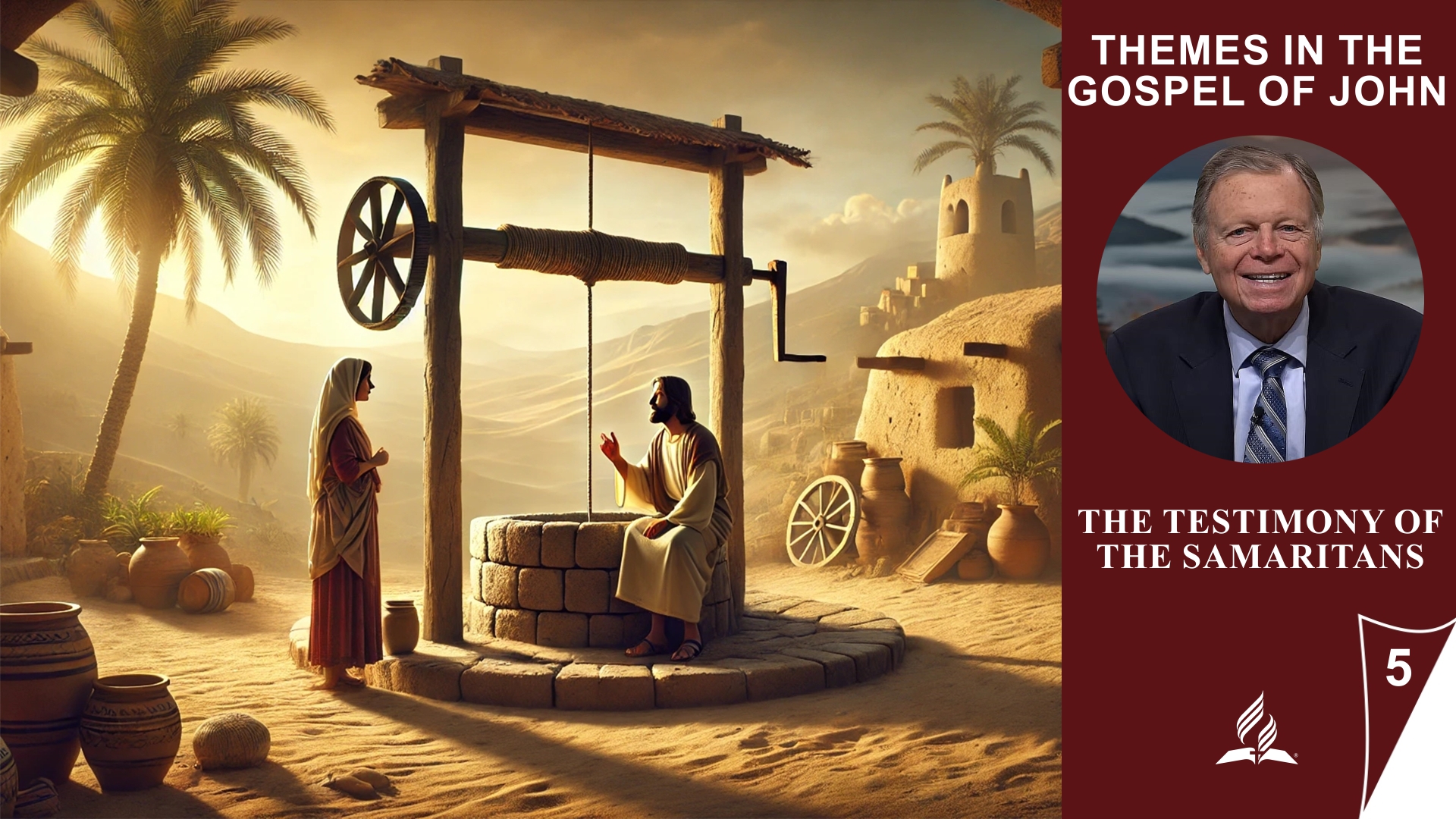
Lesson 4.Witnesses of Christ as the Messiah | 4.7 Questions | THEMES IN THE GOSPEL OF JOHN | LIVING FAITH



1.John the Baptist came to prepare the way for Jesus. How successful would you consider his work, at least from a human perspective? When reflecting on your answer, also consider the important question: How do you define “success” in spiritual matters?
John the Baptist was sent to prepare the way for Jesus, and his role was crucial in proclaiming the coming Messiah. From a human perspective, one might initially judge his success differently. On one hand, John had a large following, was respected, and recognized as a prophet, making him an influential figure. Many people followed him and were baptized by him, which spread his message widely. In this sense, one could say he was successful from a human viewpoint.
On the other hand, John’s life ended in imprisonment, and he was ultimately executed. From a worldly perspective, this could be seen as a failure or an abrupt and dishonorable end to his mission. However, in spiritual terms, success is not defined by worldly achievements, recognition, or external influence. Success in spiritual matters is measured by whether one is doing God’s will, maintaining faith, and fulfilling one’s calling. John’s mission was to prepare the way for Jesus and point to Him, and he did so faithfully and courageously until the end.
The spiritual definition of success, therefore, is not in external fame or a long life, but in being faithful to God, fulfilling His mission, and leading others to Christ. In this sense, John’s work was extremely successful, as he fully fulfilled his role as the forerunner of the Messiah, pointed many people to Jesus, and did not abandon his faith even in the face of death.
2.Later, John the Baptist expressed some sincere doubts (Matt 11:2–3; Luke 7:19). What were the reasons for his questions, and what can we learn from this about how to stay firm in our faith?
John the Baptist expressed doubts in Matthew 11:2–3 and Luke 7:19 while he was in prison. He sent his disciples to Jesus with the question, “Are you the one who is to come, or should we expect someone else?” These doubts were surprising, as John had previously clearly testified that Jesus is the Messiah (John 1:29). However, these moments of uncertainty show that even spiritually strong individuals can experience doubts in difficult times.
Reasons for John’s Doubts:
-
Imprisonment and Isolation: John was in prison, isolated, and in an extreme life situation, which can lead to uncertainty. Such circumstances often negatively affect thinking and faith, as one may feel abandoned and helpless.
-
Unmet Expectations: John may have, like many others, expected the Messiah to be a powerful deliverer and judge who would free Israel from its oppressors, such as the Romans. Seeing Jesus in His role as a gentle teacher and healer might have confused him, as this role did not align with traditional notions of a mighty, political Messiah.
-
Lack of Direct Intervention: John saw no visible signs that Jesus would end his suffering or free him from prison in any way. Jesus’ silence could have increased his doubts about whether Jesus was indeed the promised Savior.
What We Can Learn:
-
Doubts Are Human: John the Baptist, considered one of the most important biblical figures, experienced doubts. This shows that doubts in the faith life are normal and do not mean that someone has lost their faith. It is important to recognize that even faithful servants of God struggle with uncertainties and questions.
-
Hope in Times of Darkness: John was isolated and suffering. In such moments, we tend to see reality distorted. Instead of giving up faith, John sent his disciples to Jesus to seek clarity. This teaches us that in difficult times, we should come to Jesus and honestly express our doubts, rather than being overwhelmed by them.
-
Recognizing That God’s Plan Is Different: John’s doubts were also based on false expectations of the Messiah. We can learn that God often acts differently than we expect. Our understanding of God’s plan can be limited, and it is important to trust God’s bigger plan, even if it does not align with our short-term expectations.
-
Staying Firm in Faith: When Jesus responded to John’s question, He not only referred to the miracles He was performing but also cited messianic prophecies (Matt 11:4–6). He indirectly encouraged John to strengthen his faith through the Scriptures and the fulfillment of the prophecies. This shows us that we should base our faith on God’s Word and His promises, especially in times of doubt.
Conclusion:
John the Baptist teaches us that even the strongest believers can face doubts. In such moments, our relationship with God, trust in His promises, and willingness to bring our uncertainties to Him help us stay firm in faith. Doubts can be an opportunity to deepen our faith if we approach God in these moments and seek clarity and strength from Him.
3.Discuss how someone like Nicodemus, a leader in the true church who certainly possessed much knowledge, could still be so spiritually ignorant regarding what truly matters. What lessons can we draw from his situation?
Nicodemus was a respected teacher and member of the Sanhedrin, the highest Jewish religious and political authority. As such, he possessed extensive knowledge of the Scriptures, Jewish traditions, and laws. Yet, despite his intellectual and religious knowledge, he lacked a deep understanding of the spiritual truths that Jesus was trying to convey—particularly the necessity of “rebirth” through the Holy Spirit (John 3:3). This raises the question of how someone with so much religious knowledge could remain spiritually ignorant.
Reasons for Nicodemus’ Spiritual Ignorance:
-
Intellectual Knowledge Without Spiritual Understanding: Nicodemus knew the Scriptures and the prophecies well, but his knowledge was more theoretical than spiritual. He had much intellectual insight into God and the laws, but lacked personal experience and inner revelation. He viewed faith mainly as something external—law obedience and religious duties—and did not grasp the core of spiritual repentance and renewal.
-
Traditions and Religious Systems: As a member of the Sanhedrin, Nicodemus was deeply embedded in religious traditions and Jewish law. These traditions were often so strong that they hindered the understanding of deeper spiritual truth. For Nicodemus, it was difficult to break away from the entrenched belief system and accept Jesus’ revolutionary teachings.
-
Pride and Status: Nicodemus held a respected position in society. This status could have made it difficult for him to adopt an attitude of humility and accept that, despite his knowledge, he did not understand something essential. It is often hard for people in leadership positions to admit that they still need spiritual growth.
-
Lack of Personal Spiritual Experience: Nicodemus was a scholar, but he seemed to lack a deep personal encounter with God. He may have intellectually grasped the teachings of the Scriptures but did not experience the transformative power of the Spirit. This personal connection is what Jesus describes as “being born again”—a spiritual renewal that goes deeper than mere knowledge.
Lessons from Nicodemus’ Situation:
-
Knowledge Alone Is Not Enough: Spiritual maturity is not achieved solely through intellectual knowledge or understanding of religious texts. Even the most accurate knowledge of the Bible or religious laws does not necessarily lead to deep spiritual understanding. We must cultivate a personal relationship with God and allow His Spirit to guide us to gain true spiritual insight.
-
The Danger of Pride and Self-Righteousness: Nicodemus’ position and knowledge might have prevented him from recognizing that he needed to learn something new. Pride or reliance on our own wisdom can be obstacles that prevent us from receiving God’s revelations. Spiritual humility is essential to be willing to learn from God, regardless of our status or knowledge.
-
Traditions Can Block Understanding: Religious traditions and systems can sometimes hinder the understanding of true spiritual meaning. Nicodemus was deeply involved in Jewish traditions, which emphasized a law-based faith. However, Jesus taught that faith goes beyond traditions and laws and requires personal, inner renewal. This reminds us that we should be open to new revelations from God, even if they contradict our previous beliefs.
-
Spiritual Rebirth: Jesus’ central teaching to Nicodemus was that every person—regardless of their knowledge or religious position—must be reborn to see the kingdom of God (John 3:3). This spiritual rebirth is a transformative experience brought about by the Holy Spirit. It means beginning a new life in Christ and seeking a deeper, inner relationship with God.
Conclusion:
Nicodemus shows us that intellectual knowledge and religious positions alone are not sufficient to recognize true spiritual truth. Spiritual understanding does not come through external rituals or following laws, but through personal, inner renewal and the guidance of the Holy Spirit. His story reminds us that we must remain open and humble to grow in our faith and allow God to transform us.
26.10.2024 – John Chapter 20 | BELIEVE HIS PROPHETS
October 26, 2024
DAILY BIBLE READING – John Chapter 20
1 The first day of the week cometh Mary Magdalene early, when it was yet dark, unto the sepulchre, and seeth the stone taken away from the sepulchre.
2 Then she runneth, and cometh to Simon Peter, and to the other disciple, whom Jesus loved, and saith unto them, They have taken away the Lord out of the sepulchre, and we know not where they have laid him.
3 Peter therefore went forth, and that other disciple, and came to the sepulchre.
4 So they ran both together: and the other disciple did outrun Peter, and came first to the sepulchre.
5 And he stooping down, and looking in, saw the linen clothes lying; yet went he not in.
6 Then cometh Simon Peter following him, and went into the sepulchre, and seeth the linen clothes lie,
7 And the napkin, that was about his head, not lying with the linen clothes, but wrapped together in a place by itself.
8 Then went in also that other disciple, which came first to the sepulchre, and he saw, and believed.
9 For as yet they knew not the scripture, that he must rise again from the dead.
10 Then the disciples went away again unto their own home.
11 But Mary stood without at the sepulchre weeping: and as she wept, she stooped down, and looked into the sepulchre,
12 And seeth two angels in white sitting, the one at the head, and the other at the feet, where the body of Jesus had lain.
13 And they say unto her, Woman, why weepest thou? She saith unto them, Because they have taken away my Lord, and I know not where they have laid him.
14 And when she had thus said, she turned herself back, and saw Jesus standing, and knew not that it was Jesus.
15 Jesus saith unto her, Woman, why weepest thou? whom seekest thou? She, supposing him to be the gardener, saith unto him, Sir, if thou have borne him hence, tell me where thou hast laid him, and I will take him away.
16 Jesus saith unto her, Mary. She turned herself, and saith unto him, Rabboni; which is to say, Master.
17 Jesus saith unto her, Touch me not; for I am not yet ascended to my Father: but go to my brethren, and say unto them, I ascend unto my Father, and your Father; and to my God, and your God.
18 Mary Magdalene came and told the disciples that she had seen the Lord, and that he had spoken these things unto her.
19 Then the same day at evening, being the first day of the week, when the doors were shut where the disciples were assembled for fear of the Jews, came Jesus and stood in the midst, and saith unto them, Peace be unto you.
20 And when he had so said, he shewed unto them his hands and his side. Then were the disciples glad, when they saw the Lord.
21 Then said Jesus to them again, Peace be unto you: as my Father hath sent me, even so send I you.
22 And when he had said this, he breathed on them, and saith unto them, Receive ye the Holy Ghost:
23 Whose soever sins ye remit, they are remitted unto them; and whose soever sins ye retain, they are retained.
24 But Thomas, one of the twelve, called Didymus, was not with them when Jesus came.
25 The other disciples therefore said unto him, We have seen the Lord. But he said unto them, Except I shall see in his hands the print of the nails, and put my finger into the print of the nails, and thrust my hand into his side, I will not believe.
26 And after eight days again his disciples were within, and Thomas with them: then came Jesus, the doors being shut, and stood in the midst, and said, Peace be unto you.
27 Then saith he to Thomas, Reach hither thy finger, and behold my hands; and reach hither thy hand, and thrust it into my side: and be not faithless, but believing.
28 And Thomas answered and said unto him, My Lord and my God.
29 Jesus saith unto him, Thomas, because thou hast seen me, thou hast believed: blessed are they that have not seen, and yet have believed.
30 And many other signs truly did Jesus in the presence of his disciples, which are not written in this book:
31 But these are written, that ye might believe that Jesus is the Christ, the Son of God; and that believing ye might have life through his name.
King James Version. Public Domain
Commentary
Introduction:
John Chapter 20 depicts the central and decisive message of Christian faith: the resurrection of Jesus from the dead. It describes the events of Easter morning, beginning with Mary Magdalene discovering the empty tomb, through Jesus appearing to His disciples, and culminating in the encounter with the doubting Thomas. In this chapter, not only is Jesus’ victory over death proclaimed, but also the confirmation of His divine mission and the commencement of His disciples’ mission, empowered by the Holy Spirit.
Commentary:
The chapter begins with a profound human experience: Mary Magdalene arrives early in the morning at Jesus’ tomb to cope with her grief. Her encounter with the empty tomb initially causes confusion and alarm. She believes that someone has stolen Jesus’ body and hurries to Peter and John to deliver this news. This reaction demonstrates that even Jesus’ closest friends and disciples were unprepared for the resurrection, despite Jesus having repeatedly hinted at it.
The scene where Peter and John rush to the tomb is significant. John, being faster than Peter, pauses and waits until Peter is the first to enter the tomb. This moment underscores the dynamic relationship between the two disciples: Peter, the impulsive leader, takes the initiative, while John, the beloved disciple, respectfully follows. As both enter the tomb and see the meticulously arranged linen cloths and the napkin, their faith in the resurrection begins to grow, even though they have not yet fully understood the Scriptures.
A central element of this chapter is Mary Magdalene’s encounter with the risen Jesus. Her tears and despair when she initially does not recognize Jesus reflect the human experience of grief. However, when she hears Jesus calling her by name, she recognizes Him and refers to Him as “Rabbuni”—which means “Teacher.” This intimate and personal encounter demonstrates how Jesus knows His disciples not only as teachers but also as friends and shepherds. His instruction to Mary not to touch Him indicates that He is still in the process of ascending to the Father, but also signifies that the relationship between Jesus and His disciples has now changed. He is no longer the earthly Rabbi but the glorified Son of God who will soon ascend to the Father.
Another important section of this chapter is Jesus’ first appearance to His assembled disciples on the evening of Easter day. The disciples are gathered in a locked room out of fear of the Jews, yet Jesus suddenly stands among them. His first words are, “Peace be with you,” which carry a dual meaning: on one hand, He calms their fears, and on the other, He announces the new peace His resurrection brings—the peace between God and humanity. The gesture of showing His wounds serves as confirmation that the risen Jesus is indeed the one who suffered on the cross and that His resurrection is real and physical. The breath He imparts to them is the Holy Spirit, which empowers them for their future mission and grants them the authority to forgive or retain sins.
The section involving Thomas, often called “the Doubter,” is particularly significant. Thomas was not present when Jesus first appeared to the disciples and openly expresses his skepticism. His demand to touch Jesus’ wounds to believe reflects the natural human tendency to seek evidence. Eight days later, Jesus fulfills this demand by appearing again, specifically to meet Thomas. Jesus invites him to touch His wounds, and Thomas responds, “My Lord and my God!” without hesitation, demonstrating his newfound faith. This scene not only highlights Jesus’ patient care regarding His disciples’ doubts but also emphasizes the importance of faith. Jesus’ words to Thomas—”Blessed are those who have not seen and yet have believed”—encourage all believers who have not physically seen Jesus to trust in His resurrection. This is a core tenet of the Christian faith: belief in the unseen, trust in the testimony of the Scriptures, and the testimony of the disciples.
The final two verses of the chapter (John 20:30-31) offer an important reflection on the purpose of the Gospel. John states that Jesus performed many more signs that are not recorded in this book, but what is written serves a clear purpose: to foster belief in Jesus Christ, the Son of God, so that people may have eternal life through this faith. This emphasizes that the Gospel is not merely a historical account but a means of promoting faith and redemption.
Summary:
John 20 describes Easter morning and the disciples’ encounters with the risen Jesus. Mary Magdalene discovers the empty tomb and later meets Jesus, who commissions her to convey the message of His resurrection to the disciples. Jesus appears to the disciples in the evening and imparts the Holy Spirit to prepare them for their future mission. Thomas, who initially doubted, is invited by Jesus to touch His wounds and confesses his faith. The belief in Jesus’ resurrection is emphasized as a central point of Christian faith, and John concludes the chapter by explaining that his Gospel was written to ensure that people believe in Jesus Christ and attain eternal life through this belief.
![]()

WEEKLY SPIRIT OF PROPHECY READING – Ellen White | The Desire of Ages
Chapter 72—“In Remembrance of Me”
This chapter is based on Matthew 26:20-29; Mark 14:17-25; Luke 22:14-23; John 13:18-30.
Read online here
Commentary
Introduction
Chapter 72 deals with one of the most central moments in the life of Jesus and Christian theology: the institution of the Lord’s Supper, which Jesus celebrated with His disciples during the Passover festival. This moment, described in the Gospels of Matthew, Mark, Luke, and John, marks the transition from the Jewish tradition of Passover to a new covenant, symbolized by the bread and wine that Jesus referred to as His body and blood. This act points both to His impending sacrifice on the cross and to the hope of Christ’s return. This chapter describes the profound significance of the Lord’s Supper, the despair of the disciples in the face of the impending betrayal, and the symbolic power of the promise of redemption.
Commentary
In this chapter, Jesus institutes the Lord’s Supper, making it a central rite for His followers. During the Last Passover meal, which traditionally commemorates the liberation of Israel from Egyptian bondage, Jesus gives the meal a new meaning. He takes the bread and the wine and declares that these elements represent His body and His blood, which are given for the sins of the world. Thus, the Passover, which was a symbol of the Jews’ liberation from physical slavery, is transformed into the Lord’s Supper, which signifies the liberation of humanity from the bondage of sin through Jesus’ death.
The institution of the Lord’s Supper marks the beginning of the “New Covenant,” which is sealed by Jesus’ death and resurrection. This new order replaces the old Jewish law and the ritual sacrifices. Instead, Jesus’ sacrifice and the remembrance thereof take center stage in the believers’ faith life. The chapter makes it clear that the Lord’s Supper is not merely a symbolic act but a means of spiritual strengthening that fosters community with Christ and among the believers themselves.
Judas’ behavior, as he focuses on his betrayal amidst this sacred act, highlights the stark contrast between Jesus’ gracious offer and human sin. Jesus is aware of Judas’ betrayal but continually gives him opportunities to repent, underscoring Jesus’ infinite patience and mercy. Despite the darkness surrounding Judas, the invitation to grace remains open until the last moment.
Another central point in this chapter is the emphasis on spiritual preparation and self-examination before partaking in the Lord’s Supper. Believers are called to participate at the Lord’s table in holiness and reverence. No one is to be excluded from this celebration, but it is necessary for each individual to examine their own heart before partaking in the Lord’s Supper.
Summary
Chapter 72 of the book The Life of Jesus offers a deep reflection on the institution of the Lord’s Supper by Jesus during the Passover festival. Jesus uses this opportunity to explain the bread and wine as symbols of His impending death, which will free humanity from sin. This new celebration replaces the traditional Jewish Passover and marks the beginning of the New Covenant, established through Christ’s sacrifice. The act in which Judas plans to betray Jesus demonstrates the serious consequences of sin and betrayal. At the same time, Jesus demonstrates God’s profound mercy through His patience and offer of grace. The chapter highlights the significance of the Lord’s Supper as a source of spiritual strength and community with Christ and among believers, and emphasizes the necessity of self-examination and preparation before participation. It reminds believers to live in anticipation of Jesus’ return, which is proclaimed in every celebration of the Lord’s Supper.
Source: https://fulfilleddesire.net/26-10-2024-john-chapter-20-believe-his-prophets/
Adventist News Network – October 25, 2024: AdventHealth, early breast cancer detection & More Global News

Adventist News Network – October 25, 2024: AdventHealth, early breast cancer detection & More Global News |
This week on ANN: |
· ADRA promotes the safety and inclusion of children with albinism in Tanzanian schools. Adventists break new ground by empowering youth to communicate and include the Deaf community in the Philippines.
· AdventHealth revolutionizes early breast cancer detection with advanced Artificial Intelligence.
· Also, youth lead an environmental task force, reshaping landscapes and raising community awareness in Panama.
· Plus, the Adventist Church in Spain impacts the community with ExpoBible, sparking spiritual conversations and distributing Christian literature.
· Also, Youth heads an environmental task force, reshaping landscapes and raising community awareness in Panama and the Adventist Church in Spain impacts the community with ExpoBible, sparking spiritual conversations and distributing Christian literature.
· Stay tuned as ANN brings everything you have to know about what is happening in the church worldwide.
Lesson 4.Witnesses of Christ as the Messiah | 4.6 Summary | THEMES IN THE GOSPEL OF JOHN | LIVING FAITH


4.6 Summary
The Diverse Testimonies About Jesus as the Messiah
Lesson 4 deals with the diverse testimonies about Jesus Christ as the Messiah presented in the Gospel of John. Through the testimony of John the Baptist, the first disciples, and through the encounters with Nathanael and Nicodemus, Jesus’ identity as the promised Savior and Messiah is revealed. Each of these testimonies offers deeper insight into the nature and mission of Jesus and shows how people recognize Him as God’s envoy and respond to His teachings.
John the Baptist: The Witness for the Messiah
John the Baptist played a central role as the forerunner and witness of Jesus. In John 1:19–28, John clearly understands that he is not the Messiah, but the one who is to prepare the way for the true Messiah. He testifies about Jesus as “the Lamb of God,” who takes away the sin of the world (John 1:29). This image refers to the Old Testament sacrificial system, where lambs were sacrificed for the sins of the people. John thus indicates that Jesus has come to serve as the ultimate sacrifice for humanity, correcting the prevalent image of a military Messiah.
By pointing out Jesus’ role as the Lamb of God, he directs attention to the spiritual dimension of salvation. Jesus fulfills the Old Testament prophecies not through military power, but through His self-sacrifice and the sacrifice of His life. This testimony shows the central message of the Gospel of John: Jesus has come to restore the relationship between God and humans through His death.
The First Disciples: Andrew, Simon Peter, Philip, and Nathanael
The first disciples of Jesus, including Andrew and Simon Peter, recognize Jesus based on John the Baptist’s testimony. Andrew hears John say that Jesus is the Lamb of God and follows Him immediately (John 1:35–40). Andrew then brings his brother Simon Peter to Jesus, demonstrating the immediate effect of the encounter with the Messiah. Jesus gives Simon the new name “Cephas” (Peter), indicating his future role in the church. This encounter shows how people, upon meeting Jesus, experience a profound change and enter His service.
Philip, another disciple, is equally enthusiastic and invites Nathanael to meet Jesus. In John 1:43–51, we see Philip telling Nathanael that Jesus is the one “about whom Moses and the prophets wrote.” Philip thus shows that he recognizes Jesus as the fulfillment of messianic prophecies. However, Nathanael initially meets this message with skepticism and prejudice against Nazareth, a city he considers insignificant. Instead of arguing, Philip simply invites him: “Come and see!”
This invitation is powerful because it gives Nathanael the opportunity to meet Jesus personally and overcome his doubts. When Nathanael finally meets Jesus, he is deeply moved as Jesus reveals that He has already seen him “under the fig tree.” This divine insight convinces Nathanael and leads him to confess, “Rabbi, you are the Son of God, you are the King of Israel” (John 1:49). The encounter with Jesus shows Nathanael that his initial prejudices were unfounded and that Jesus truly is the promised Messiah.
Nicodemus: The Necessity of Spiritual Rebirth
Nicodemus, a respected teacher of Israel and member of the Sanhedrin, comes to Jesus in John 3:1–21 to learn more about Him. Although Nicodemus acknowledges Jesus as Rabbi and sees the signs pointing to His divine calling, he does not immediately grasp the full meaning of Jesus’ mission. Jesus confronts Nicodemus with a profound spiritual truth: “Unless one is born again, he cannot see the kingdom of God” (John 3:3).
Nicodemus is confused, taking this statement literally. Jesus explains that this rebirth is not physical but spiritual, accomplished by the Holy Spirit, who renews a person’s heart and life from the ground up. This message shows that access to the kingdom of God is not achieved through external affiliation or knowledge but through a profound spiritual transformation. Jesus challenges Nicodemus—and thus us—to lay aside the old self and lead a new life in faith.
Nicodemus is initially hesitant, but this encounter shapes him. Later, when Jesus is crucified, Nicodemus appears as a follower of Jesus and brings expensive ointments to anoint Jesus’ body (John 19:39). His journey from intellectual curiosity to deep faith demonstrates the transformative power of a genuine encounter with Christ.
The testimonies of John the Baptist, the disciples, and Nicodemus about Jesus as the Messiah have direct relevance to our daily lives and faith. They challenge us to overcome our prejudices, doubts, and intellectual barriers and to encounter Jesus on a deeper, more personal level. Like Nathanael, we are often skeptical or blocked by preconceived opinions, but the invitation “Come and see!” shows us that the true path to faith is through personal experience with Jesus.
The testimonies of John the Baptist, the disciples, and Nicodemus about Jesus as the Messiah have direct relevance to our everyday lives and our faith. They challenge us to overcome our prejudices, doubts, and intellectual barriers and to encounter Jesus on a deeper, more personal level. Like Nathanael, we are often skeptical or blocked by preconceived notions, but the invitation “Come and see!” shows us that the true path to faith is through personal experience with Jesus.
This lesson teaches us that we should not merely follow knowledge or traditions, but must seek a living relationship with Christ. The rebirth that Jesus speaks of is a call to be renewed inwardly each day by allowing the Holy Spirit to work in our lives. This renewal not only changes our perspective but also our behavior and our testimony to others.
The testimonies in this lesson remind us that faith is not static, but a journey of discovery, transformation, and growth. Whether we, like John the Baptist, courageously point to Jesus, like the disciples, tell others about Him, or like Nicodemus, seek deeper answers – we are all called to live out the testimony of Christ as the true Messiah in our daily lives.

Every day offers us the opportunity to be renewed internally through Christ and to grow in His grace.
- « Previous Page
- 1
- …
- 153
- 154
- 155
- 156
- 157
- …
- 704
- Next Page »

